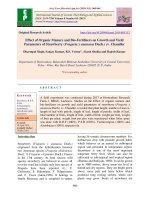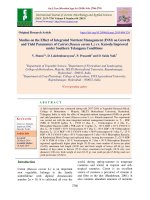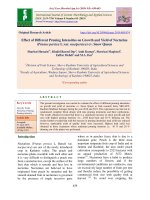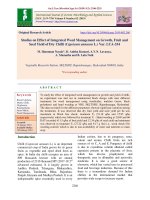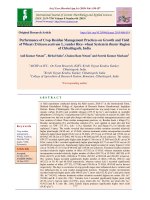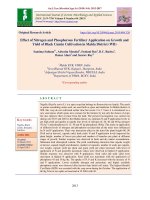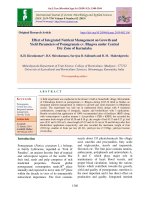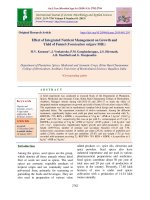Long term effect of integrated nutrient management on growth and yield of finger millet (Eleusine coracana G.) in eastern dry zone of Karnataka, India
Bạn đang xem bản rút gọn của tài liệu. Xem và tải ngay bản đầy đủ của tài liệu tại đây (213.46 KB, 6 trang )
Int.J.Curr.Microbiol.App.Sci (2019) 8(8): 2362-2367
International Journal of Current Microbiology and Applied Sciences
ISSN: 2319-7706 Volume 8 Number 08 (2019)
.
Journal homepage:
Original Research Article
/>
Long Term Effect of Integrated Nutrient Management on
Growth and Yield of Finger Millet (Eleusine coracana G.) in
Eastern Dry Zone of Karnataka, India
D.V. Prashanth1*, R. Krishnamurthy1, D V. Naveen2,
L. Anand Kumar1, B.R. Harsha1 and M. Savitha1
1
Department of Soil Science and Agricultural Chemistry, College of Agriculture,
GKVK, UAS, Bengaluru, India
2
Department of Soil Science and Agricultural Chemistry, College of Sericulture,
Chintamani, India
*Corresponding author
ABSTRACT
Keywords
LTFE, INM,
Growth, Yield and
finger millet
Article Info
Accepted:
22 July 2019
Available Online:
10 August 2019
A field experiment on “Long term effect of integrated nutrient management on finger
millet (Eleusine coracana G.) growth and yield was recorded at AICRPDA, GKVK, UAS,
Bengaluru, during kharif 2018 with 8 treatments, replicated thrice laid out in RCBD. The
results of the field experiment revealed that growth and yield parameters of finger millet
such as plant height (96.53 cm), number of tillers per hill (7.60), number of ear heads per
hill (7.37), number of fingers per ear head (6.61), test weight (3.56 g) and total dry mater
production (82.67g per hill) were higher with the application of FYM @ 10 t ha -1 + 100%
RDF. The grain (20.96 q ha-1) and straw (25.40 q ha-1) yield was found to be higher with
the application of 10 tonnes FYM ha-1 and 100% RDF. This clearly indicated that
application of organic and inorganic sources of nutrients increases growth and yield of
finger millet as compare to inorganic only.
Introduction
Long-term experiments are those, which are
conducted on the same set of experimental
units over a sequence of years with preplanned sequence of treatments or crops or
both on crop productivity, soil health and
economics. Long-term fertilizer experiments
provide valuable information on agricultural
sustainability, environmental quality, nutrient
uptake and physico-chemical changes of soil.
Besides, providing information on better
understanding of soil and plant processes, it
also provides data on benefits to farmers,
policy makers and extension functionaries.
Intensive cultivation, growing of exhaust
crops, use of imbalanced and inadequate
fertilizers, restricted use of organic manures
which have made the soils not only deficient
in nutrients but also deteriorate soil health
resulting decline in crop response to
recommended dose of NPK fertilizers. Under
such
conditions,
integrated
nutrient
management assumes greater significance and
2362
Int.J.Curr.Microbiol.App.Sci (2019) 8(8): 2362-2367
plays a vital role in maintenance of soil health
and sustainable productivity.
A long-term fertilizer trial established during
1978 at All India Co-Ordinated Project on
Dryland Agriculture, GKVK, Bengaluru
provides
some
direction
for
better
management of finger millet-groundnut
cropping system. The continuous dressing of
organic manure and crop residues could
undoubtedly match the nutrient requirement
of crop plants, where nutrient demands are
comparatively smaller but will be inadequate
under finger millet-groundnut cropping
system in the long run. However, integrated
use of organics, crop residues and chemical
fertilizers has been found promising not only
in maintaining and sustaining high
productivity but also in providing stability to
crop production. In this context, combination
of organic with inorganic nutrients and crop
residues at different levels were evaluated
finger millet growth and yield as a test crop.
classification, soils are classified as fine,
Kaolinitic,
isohyperthermic,
Typic
Kandiustalf. These soils are yellowish red,
lateritic and are derived from granite-gneiss
under sub-tropical semi-arid climate. They are
very deep, well drained sandy clay loam
occurring in nearly level to gently sloping
lands. Initial physio-chemical properties of
experimental soil given in Table 1.
Experimental details
The test crop selected was finger millet,
variety GPU 28. Experiment was carried out
following randomized complete block design
(RCBD) with 8 treatments and three
replications. Treatment details are T1: absolute
control, T2: 100% RDF, T3: FYM @ 10 t ha-1,
T4: FYM @ 10 t ha-1 + 50% RDF, T5: FYM
@ 10 t ha-1 + 100% RDF, T6: Maize residue
@ 5 t ha-1, T7: Maize residue @ 5 t ha-1 +
50% RDF, T8: Maize residue @ 5 t ha-1 +
100% RDF
Materials and Methods
Sources of fertilizer’s
Experimental site
Two organic sources were used in our
experiment such as FYM (Farmyard manure)
and Maize Residue at the rate of 10 t ha-1 and
5 t ha-1 respectively. Whereas inorganic
sources includes urea, DAP, MOP.
The experiment was a permanent trial under
dryland agricultural project. It was initiated as
a long term integrated nutrient management
trial during 1978, with different nutrient
levels of recommended dose of fertilizer and
FYM as an organic nutrient source. Later one
more source of organic manure (maize
residue) was introduced during 1984
considering the reduced availability of FYM.
Totally, 40 years of experimentation was
maintained previously during kharif2018.
Finger millet in mono-cropping was tested.
The land was left fallow during summer
season of all the years. The soils of Dryland
Agriculture Project represent the typical
lateritic area of Bengaluru plateau and belong
to Vijayapura series, which is a dominant soil
series of Bengaluru plateau. As per USDA
Plant growth observation
Plant growth parameters like plant height,
number of tillers per plant number of ear
heads per hill and numbers of fingers per ear
head were recorded at harvest by employing
standard procedures
Yield observation
Yield and yield attributes such as test weight,
total dry mater, grain and straw yield were
recorded at harvest as per standard protocol.
2363
Int.J.Curr.Microbiol.App.Sci (2019) 8(8): 2362-2367
Results and Discussion
Number of ear heads / hill
Effect of long-term integrated nutrient
management on growth parameters of
finger millet
Significantly higher values for No. of ear
heads/hill (7.37) was recorded in T5 (FYM @
10 t ha-1 + 100% RDF), followed by treatment
T4 (FYM @ 10 t ha-1 + 50% RDF) where as
absolute control recorded lower No. of ear
heads / hill (1), greater availability of macro
and micronutrients from FYM and inorganic
sources of nutrients, which helped in
acceleration of various metabolic processes
(Umesh (2002), Govindappa (2003)).
The results of the field experiment carried out
during kharif, 2018, to study the effect of
long-term integrated nutrient management on
the growth parameters of finger millet are
presented in Table 2.
Plant height (cm)
Number of fingers per ear head
The results of the present investigation
revealed that T5 (FYM @ 10 t ha-1 + 100%
RDF) recorded significantly higher values for
plant height (96.53 cm), followed by
treatment T4 (FYM @ 10 t ha-1 + 50% RDF)
where plant height (80.13 cm) was recorded,
T8 (Maize residue @ 5 t ha-1 +100% RDF)
(79.43 cm) which was on par with the
treatment T4, where as absolute control
recorded lower plant height (43.33 cm), The
increase in the plant height might be due to
enhanced sugar translocation and turgor
pressure in plant cell that leads to cell
enlargement and multiplication (Hooda
(2002) and Abbasi et al., (2014).
Significantly higher values for number of
fingers per ear head (6.61) noticed in T5
(FYM @ 10 t ha-1 + 100% RDF), followed by
treatment T4 (FYM @ 10 t ha-1 + 50% RDF)
where as absolute control recorded lowest
number of fingers per ear head (3.40), The
possible reason could be due to N, P2O5 and
K2O which improves root growth and
tillering, resulting in increase in amount of
interception of photo synthetically active
radiation and greater photosynthesis by crop
(Gill and Singh, 1985) (Dhurandher and
Tripathi, 1999).
Number of tillers / hill
Effect of long-term integrated nutrient
management on yield parameters of finger
millet
The results of the present investigation
revealed that recorded significantly higher
values for No. of tillers/hill (7.6), followed by
treatment T4 (FYM @ 10 t ha-1 + 50% RDF)
where (5.73), was recorded, T8 (Maize residue
@ 5 t ha-1 +100% RDF) (5.90) which was on
par with the treatment T4, where as absolute
control recorded lower No. of tillers/hill
(1.67).
Combined application of organic matter and
chemical fertilizers increased number of
fingers per ear head in finger millet
(Gangadhar Nanda, 2015).
The results of the field experiment carried out
during kharif, 2018, to study the effect of
long-term integrated nutrient management on
the yield parameters of finger millet are
presented in Table 3.
Test weight
1000 seed weight of finger millet varied
significantly among the different treatments.
Significantly higher test weight (3.56 gm) was
recorded with the application of FYM @ 10 t
ha-1 + 100% RDF. (T5). Kalaivanan and
2364
Int.J.Curr.Microbiol.App.Sci (2019) 8(8): 2362-2367
Hattab (2016) reported that the increase in
1000 seed weight might be due to rapid
nitrogen mineralization from organic sources
with adequate supply of inorganic nitrogen
leading to increased nutrition of crop that
resulted in translocation of photo-syntheses to
seeds, which ultimately recorded more test
weight of seeds.
Total dry matter production (g hill-1)
The total dry matter production (g hill-1)
varied significantly among the different
treatments. Significantly higher total dry
matter production (g hill-1) (82.67) was
recorded with the application of FYM @ 10 t
ha-1 + 100% RDF (T5). Lower value was
recorded for the absolute control (1.11 g hill1
) the positive effect of farmyard manure in
increasing the nutrients uptake leading to
higher dry matter production as reported by
Jayabharath and Sharanappa (2003), Avinish
and Kushwaha (2006).
Grain and straw yield
Significant variations were observed in grain
and straw yield of finger millet between the
treatments. Significantly higher grain yield
(20.96 q ha-1) and straw yield (25.46 q ha-1)
was obtained with FYM @ 10 t ha-1 + 100%
RDF (T5). The positive effect of increase in
grain and straw yield of finger millet might be
due higher and balanced supply of plant
nutrients through organic sources and
inorganic fertilizers (Rangaraj et al., 2007 and
Selvamurugan et al., 2013).
Table.1 Physical and chemical properties of soil prior to the experiment in 1978
Physical properties
Coarse sand (%)
Fine sand (%)
Silt (%)
Clay (%)
Textural class
Maximum water holding capacity (%)
Pore space (%)
Volume expansion (%)
Bulk density (Mg m-3)
Chemical properties
pH
EC (dS m-1)
Organic carbon (%)
Available nitrogen (kg ha-1)
Available phosphorus (kg ha-1)
Available potassium (kg ha-1)
Exchangeable calcium (cmol (p+) kg-1)
Exchangeable magnesium (cmol (p+) kg-1)
Exchangeable potassium (cmol (p+) kg-1)
2365
42.00
30.50
6.20
21.20
Sandy clay loam
29.40
41.80
2.40
1.64
5.00
0.20
0.40
200.0
8.70
132.80
2.30
0.75
0.30
Int.J.Curr.Microbiol.App.Sci (2019) 8(8): 2362-2367
Table.2 Effect of long-term integrated nutrient management on growth and yield of finger millet
Treatments
T1: Absolute control
T2: 100% RDF
T3: FYM @ 10 t ha-1
T4: FYM @ 10 t ha-1 + 50% RDF
T5: FYM @ 10 t ha-1 + 100%
RDF
T6: Maize Residue @ 5 t ha-1
T7: Maize Residue @ 5 t ha-1 +
50% RDF
T8: Maize Residue @ 5 t ha-1 +
100% RDF
S.Em±
CD @ 5%
Plant
height
(cm)
43.33
67.50
73.10
80.13
96.53
No. of tillers/
hill
1.00
4.33
4.57
5.73
7.60
No. of
ear
heads/hill
1.67
4.30
4.70
6.17
7.37
No. of
fingers/
ear head
3.40
5.20
5.32
6.06
6.61
61.53
77.50
4.37
5.57
4.00
5.67
5.07
5.77
79.43
5.67
5.90
5.90
3.59
10.89
0.32
0.97
0.32
0.99
0.30
0.92
Table.3 Effect of long-term integrated nutrient management on yield parameters of finger millet
Treatments
Test weight
(g)
T1: Absolute control
T2: 100% RDF
T3: FYM @ 10 t ha-1
T4: FYM @ 10 t ha-1 +
50% RDF
T5: FYM @ 10 t ha-1 +
100% RDF
T6: Maize Residue @ 5 t
ha-1
T7: Maize Residue @ 5 t
ha-1 + 50% RDF
T8: Maize Residue @ 5 t
ha-1 + 100% RDF
S.Em±
CD @ 5%
2.03
3.11
3.17
3.47
Total dry matter
production
(g hill -1)
1.11
38.18
42.17
56.87
3.56
Yield (qha-1)
Grain
Straw
0.94
11.64
12.58
18.09
1.79
18.63
22.18
21.73
82.67
20.96
25.40
3.06
28.80
7.64
12.90
3.28
46.13
15.45
20.65
3.32
50.17
16.37
21.28
0.20
0.60
2.77
8.40
0.72
2.19
0.99
3.01
In conclusion, application of organic
fertilizers along with inorganic fertilizers had
positive impact on crop growth and yield of
finger millet and maintained good soil health.
Among all the treatments imposed application
of FYM @ 10 t ha-1 + 100% RDF (T5) was
found to increase the growth and yield of
finger millet.
2366
Int.J.Curr.Microbiol.App.Sci (2019) 8(8): 2362-2367
References
Abbasi, G., Anwar, U. H., Moazzam, J.,
Muhammad, A. U. H., Shafaqat, A.,
Ahmad, M., Akhtar, F., Muhammad, A.
I., Hamid, N. K. and Muhammad, A. K.,
2014,
Enhancement
of
maize
production through integrated plant
nutrient management in arid climate. J.
Pure and App. Sci., 24-33(1-2): 7-16.
Avinish Kumar and Kushwaha, H. S., 2006,
Response of pigeonpea (Cajanus cajana
L.) to sources and levels of phosphorus
under rainfed conditions. Indian J.
Agron., 51(1): 60-62.
Dhurandher, R. L. and Tripathi, R. S., 1999,
Impact of sowing method and N- levels
on productivity of late duration rice
cultivars in Vertisol. Haryana J. Agron.,
15(1): 1-5.
Gangadhar Nanda, 2015, Effect of different
compost levels and inorganics on the
performance of basmati rice (Oryza
sativa L.) cv. Hubr 10-9. M.Sc.(Agri)
Thesis, Inst. Agri. Sci, Banaras Hindu
university, Varanasi.
Gill, H. S. and Singh, H., 1985, Effect of
Mixtalol and Agromix in relation to
varying levels of N on growth and yield
of paddy, PAU. J. Res.,22(4): 617-623.
Govindappa, 2003, Efficacy of different
organic manures and inorganic fertilizer
on growth yield of rain fed finger millet.
M.Sc. (Agri.) Thesis, University of
Agricultural Sciences, Bangalore.
Jayabharath, P. and Sharanappa, 2003,
Composted poultry waste and fertilizer
levels effect on yield and nutrient
uptake of sunflower (Helianthus
annuus) and residual NPK status. J.
Oilseeds Res., 20: 129-130.
Kalaivanan, D. and Hattab, O. K., 2016,
Recycling of sugarcane industries byproducts for preparation of enriched
pressmud compost and its influence on
growth and yield of rice (Oryza sativa
L.). Int. J. Recycl Org Waste. Agricult.,
5: 263–272.
Nehra, A. S. and Hooda, I. S., 2002, Influence
of integrated use of organic manures
and inorganic fertilizers on lentil and
mung bean yields and soil properties.
Res. Crops., 3(1): 11-16.
Rangaraj, T., Somasundaram, E., Mohamed
Amanullah, M., Thirumurugan, V.,
Ramesh, S. and Ravi, S., 2007, Effect of
agro-industrial wastes on soil properties
and yield of irrigated finger millet
(Eleusine coracana L. Gaertn) in
Coastal Soil. Res. J. Agric. & Biol. Sci.,
3(3): 153-156.
Selvamurugan, M., Doraisamy, P. and
Maheswari, M., 2013, Effect of
biomethanated distillery spentwash and
pressmud biocompost on growth, yield
and quality of sugarcane.J. Int.
Environmental
Application
and
Science., 8(4): 511-519.
Umesh, M. R., 2002, Assessment of inter
cropping, advantage of finger millet
with castor and redgram under
integrated nutrient supply levels.
M.Sc.(Agri.) Thesis, University of
Agricultural Science, Bangalore.
How to cite this article:
Prashanth, D.V., R. Krishnamurthy, D V. Naveen, L. Anand Kumar, B.R. Harsha and Savitha,
M. 2019. Long Term Effect of Integrated Nutrient Management on Growth and Yield of Finger
Millet (Eleusine coracana G.) in Eastern Dry Zone of Karnataka, India.
Int.J.Curr.Microbiol.App.Sci. 8(08): 2362-2367. doi: />
2367
